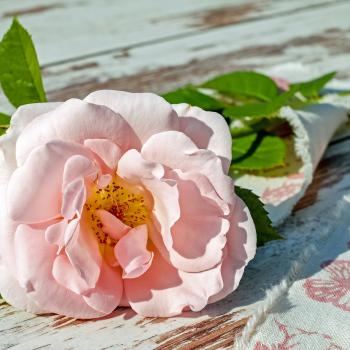At the end of my series on the sexual purity morality tale, The Three Weavers (part I, part II, part III, part IV, part V), a number of readers offered alternate endings. I enjoyed these so thoroughly I wanted to bring them together here as a sort of epilogue. Feel free to add your own additional alternate endings in the comment section!
If you haven’t read the story, here’s a quick summary. Three weavers, Herthold, Hubert, and Hildgardmar, each had a daughter, Hertha, Huberta, and Hildegarde. A fairy foretold a prince would come to wed each, and left each a magic loom to weave a mantle for her prince. Hertha secretly wove a mantle for a page boy she fancied, so her prince despised her. Huberta wove little mantles for all the boys in the village and then ran out of thread, so her prince disdained her. Hildegarde followed her father’s advice, wove a prince-sized mantle, and rode off with her prince to live happily ever after.
And now on to the alternative endings. The first one was written after the first installment of the story, which set the stage, and the rest were written after the last installment.
———
In my version of the story, the first daughter spends so little time weaving that she isn’t very good at it at all. OTOH, her lute playing is splendid and she enjoys it very much. She joins a troop of traveling musicians and lives long and happy life as a respected troop member. She finds love and/or pleasure with various troop and audience members of her own choice.
The second daughter grows up playing with the loom but receiving little instruction in the “right” way to do it. She invents a whole new style of weaving that is easier than the standard and produces a particularly strong and beautiful cloth. She meets and falls in love with a dashing accountant and together they set up a business producing cloth made by her method. The business grows throughout her life and she is known long after her death as the mother of modern textile manufacturing.
The third daughter dutifully learns from her father the “right” way to do things and succeeds in making the proper garment for her prince and marrying him. Unfortunately, as one might expect from a man who would demand that the mantel be made just for him, he’s an abusive jerk. Fortunately, her friends have not forgotten her. They rescue her and the first woman takes her to a far away land where she can rest, contemplate, and reclaim her life. She does so and becomes a famous philosopher and, people later said, the country’s leading feminist thinker.
———
So, after Herthold tore the mantle from the page’s shoulders and gave it to the prince, Hertha could clearly see it was not befitting: it was too small for the prince’s broad shoulders, and besides, according to the prince—it has been “defiled by the wearing of a common page”; why, some persnickety goody-two-shoes that prince was!
Obviously, neither the prince nor Herthold knew much about the young long-haired page: how he would lend Hertha books about the mysteries of the Universe, that they would talk about in the nights she sneaked out of the house just to be with him; how he would make hot chocolate for her, how he had taught her how to ride a bike and how he confided his deepest secrets in her. They didn’t know how, while Herthold concerned himself with teaching Hertha broidery and fair needlework, and songs upon a lute, the young page and his books taught her about the wonders of science and adventure and long lost worlds and treasures.
This is why, upon the prince’s dismay and disdain, she confidently laughed in his face:
“Why, whatever gave you the idea that it was ever meant for you?”
“What???” stuttered Herthold in shock, “so you don’t want to marry the prince and—you know—be a princess?”
“I’ve made other career choices”, she said with a grin.
So Hertha enrolled in university in the city nearby, where took to the study of archeology—and became an adventurer who spent her days seeking for ancient treasures in lands far, far away. She married the long-haired page and they traveled the world together. Some years after- they settled down in a little liberal college town: she taught archeology at the University, while the page, being a man of less career ambitions than Hertha, became a stay-at-home dad for a bunch of very happy and creative kids.
Hubertha… well, her story is perhaps less conventionally romantic. Upon realizing that she was all out of Clotho’s gold wrap, she decided to experiment with spandex instead. You see, the thing about spandex is that it stretches—and so it can fit a very wide variety of bodies, depending on whom you’d like to experiment with next. And besides—after all this weaving, she had become pretty good at creating mantles of various creative shapes, embellishing them with the adornments at hand and cutting them in many stylish shapes. Last we have heard of Huberta, she was in an open relationship with an open-minded wizard and she blogged on Tumblr about fashion design, sex-positive feminism and cupcakes.
Hertha’s and Hubertha’s princes still haven’t found wives to weave the mantle for them. The reason, they’ll tell you if you ask them (as well as if you don’t) is because obviously all women are bitches and you know, for goodness’ sake, how come they can’t get a date when they’re such nice guys?? Wife-less and mantle-less, they revised their goals a little and started organising workshops in which they talked about alfa and beta males and how to manipulate women into darning your socks.
As for Hildegard… well, all we know is that with her father’s blessing light upon her, she rode away beside the prince. Some time ago, you may remember, there was a dreamer with eyes so blue they filled all her dreams; and then there was a knight like Sir Lancelot… would any of these had been a better match for her? Would they have walked in and demanded a mantle just for their measure? Would they have appreciated her for her identity as a human being rather than for the mantle she weaved? Since they did not measure against the yardstick, I guess we’ll never know. But hey—remember that it was not Hildegard’s yardstick—it was Hildgardmar’s. So, Ye Humble Storyteller guesses, if marriage between Hildegard and the prince she married right after meeting him turned out sour and disappointing, there is a silver lining: Gay marriages are legal in nine states, so Hildgardmar, if he so wishes, can marry the fair prince himself.
Good night, children. Sleep well and dream of smashing the patriarchy.
———-
…so with a look of disdain, he rode away.
Hertha was equally angry. “Father, thou art a jerk! Why must I marry a prince, if I do not love him?”
Her father was almost too astonished to speak. “It is written in the stars that—”
“Damn the stars!” Hertha exclaimed. “If that prince thinks the page is unworthy to wear a mantle that I wove, what must he think of me, a peasant girl? Does he only wish to wed me because he would have a golden mantle?” Herthold had no answer for her.
“My lady,” the page said, “I shall love you, always, gold or no. For you have proved to be faithful, and to care more for a man’s character than for his wealth!”
With that, the page took Hertha’s hand, and they walked away. In the end, it turned out to be quite a fortunate decision, because the prince had already divorced two wives and beheaded another for what was rumored to be failure to provide him with a male heir. Hertha felt fortunate to have escaped that fate, and lived happily ever after with her page.
…he looked sorrowfully into her eyes and turned away.
All was not lost for Huberta, though. Much to her father’s dismay, many of the men for whom she had wove mantles still came to call, all quite happy that they had clothing befitting a prince. Fortunately, Huberta by now was so adept at creating precisely the correct size mantle for any customer, without even needing to use a measure, that she became renowned for being the best weaver in all the lands. Out of embarrassment that his daughter was so much more successful than he, Hubert retired and moved to a distant land where he could only find work creating mantles to be sold at the Mart of the Wall.
Huberta then adopted all the stray cats in the village, and spayed and neutered them. She kept some for herself, gave some to her childhood friends, and found the rest of them the most loving homes in which to live. It was a most fortuitous decision, for the land was stricken by a bout of the plague, and while the prince fell ill and met his untimely death, Huberta lived happily ever after with her business, her cats, her rodent-free hut, and many friends.
…she rode away with the prince;
Upon arrival at the prince’s palace, Hildegarde was stunned. It was beautiful and majestic beyond her wildest dreams! The prince’s sister, the queen, was also quite beautiful and treated Hildegarde quite kindly. Hildegarde was quite proud that her perfect mantle had won her a prince that lived in such an amazing, wonderful place.
Sadly, her delight did not last beyond that summer. For one evening, upon entering the bedchamber that she shared with her prince, she was stunned to see the queen in there, giving him a golden mantle of the queen’s own making! Ashamed and betrayed, she ran for miles, tears streaming down her face. As she looked back at the castle, and lo, it was attacked by three fiery dragons!
Alarmed at this turn of events, she quickly returned to the castle, curious about what had transpired there, and hoping against hope that her prince was alive. He was not – but, standing amidst the dragons (which were now quite placid) was a young woman, with unusual white hair, more lovely than any man or woman that Hildegarde had ever seen before. And so it was that Hildegard and the young woman fell in love, and traveled to a distant land where they were married and lived happily ever after with their trio of dragons.
———
Hertha runs away from home with the page and dates him for a couple months, but eventually they amiably break it off when they realize they don’t actually have anything in common. She flits around the social circles of various pages, squires, heralds, and other castle folk for several years before disposing of all this “true love” business to open up a shelter for victims of abusive parents/spouses.
Huberta loses her prince, but discovers much to her amazement that the various men she gave mantles to have been spreading her reputation far and wide over the land. Eventually she’s swamped with more orders than she can fill on her own, buys out her two neighboring competitors, and establishes a mantle-manufacturing conglomerate that persists for decades after her death.
Hildegarde…well, the fairy didn’t lie. Hildegarde lives happily with her prince for the rest of her days. He being accustomed to having his every whim serviced, and she being accustomed to doing whatever her patriarchal figure tells her to, they’re a perfect match. Eventually Hildegarde receives permission from her husband to write a self-help book titled Created To Be His Help Meet, which becomes a national best-seller.
In her joy at getting published, Hildegarde sends advance copies of CTBHHM to her childhood friends Hertha and Huberta. They are briefly flipped through and subsequently used as kindling.
———
The story would be more realistic if the girls were told to become excellent weavers so they had a marketable economic skill. Then they could marry someone in the Weaver’s Guild and live as prosperous peasants, in a solid house, eating meat a couple times a week. Marrying a prince is laughable.
———
I like the idea of stories subverting the idea. I’d be tempted to do something where a girl wove a cloak that was too big for the prince, and no one could work out what that meant, and the prince staged a big ugly tantrum because he was mad that she’d revealed he was smaller than he wanted people to think, and she had to go on a quest to find out what to do with all of her extra love. (I think it would include a different kind of magic warp threads that regrew more the more you wove.)









